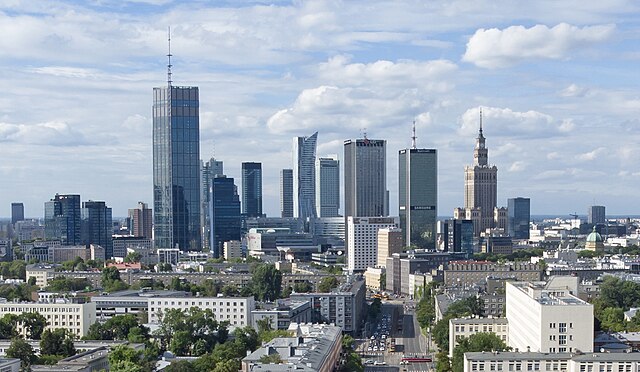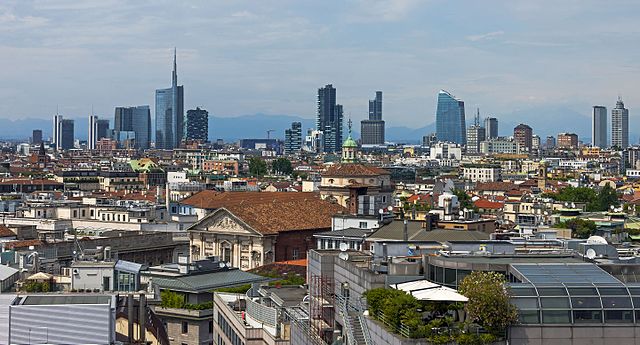Top Qs
Timeline
Chat
Perspective
List of tallest buildings in the European Union
From Wikipedia, the free encyclopedia
Remove ads
This list ranks the tallest buildings in the European Union (EU) that stand at least 150 metres (492 ft) tall, based on standard height measurement. This means that spires and other architectural details are included in the official height, but not antenna masts, as it is defined by the Council on Tall Buildings and Urban Habitat. Only habitable buildings are ranked, which excludes radio masts and towers, observation towers, cathedrals, steeples, chimneys and other tall architectural structures.

Tall buildings are relatively rare within the EU compared to other regions of the world that have the know-how and capital to build skyscrapers.[1] Only a few cities in the EU have a notable number of high-rises, best known are: Frankfurt, Warsaw, Madrid and Paris.[2] Most skyscrapers in Europe can be found outside of the EU, notably in three cities: London, Moscow and Istanbul. As a result, out of the top 500 of tallest buildings in the world –as of 2024– only one is located in the EU.[3] Since 22 February 2021 the tallest building in the EU has been the Varso Tower in Warsaw, Poland, which is 310 metres (1,017 ft) tall.[4]
Remove ads
Existing buildings
Summarize
Perspective









This list includes buildings under construction that have already been architecturally topped out. Architectural height is considered, so masts and other elements added after completion of building are not considered.
Was the union's tallest building upon completion
Was the country's tallest building upon completion
Buildings by pinnacle height
Some skyscraper enthusiasts prefer this measurement, claiming that the extensions that can or cannot be deemed "architectural" are subjective. However, many non-architectural extensions (such as radio antennas) are easily added and removed from tall buildings without significantly changing the style and design of the building, which is seen as a significant part of the value of these buildings.
The list includes all skyscrapers of at least 180 metres (591 ft) tall. However the height data is subject to fluctuations due to simple changing of mast extensions. This list includes buildings under construction that have already been architecturally topped out.
| bold | †Denotes building with pinnacle height higher than architectural |
Remove ads
Buildings under construction
This lists buildings that are under construction in European Union and are planned to rise at least 150 metres (492 ft). Approved or proposed buildings are not included in the table. Included are renders of the finished towers or images of the current construction sites.
Remove ads
Timeline of the tallest buildings in the EU/EEC
Summarize
Perspective
The following is a timeline of the tallest buildings in the European Union (EU) and its direct predecessor, the European Economic Community (EEC) established in 1957.
Prior to 1966, Edificio España and Torre de Madrid in Madrid surpassed the height of the then tallest EU building, but Spain didn't become a European Union member until 1986. Similarly, before 1990, the Palace of Culture and Science in Warsaw surpassed the height of the then tallest EU building; however, Poland did not become a member of the European Union until 2004.
The Shard ceased to be tallest building in the EU in 2020 due to the United Kingdom exiting the European Union. The title then returned to the previous holder, Frankfurt's Commerzbank Tower. Had this not been the case, the Shard would've still lost the title a few months later to Warsaw's Varso Tower regardless.
See also
Footnotes and references
Bibliography
Wikiwand - on
Seamless Wikipedia browsing. On steroids.
Remove ads

























































































